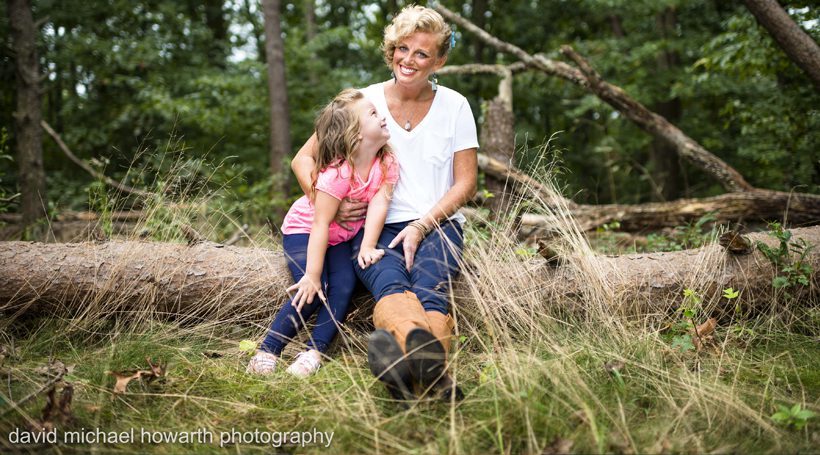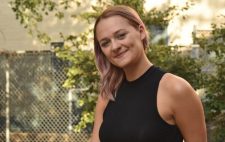Dana DeBolt-Buri was juggling work and life with a preschooler last year when she felt a lump on her left breast. At a time when she and her husband were just starting to think about having another child, she was diagnosed with breast cancer. Life as they knew it went on hold. She was just 33.
Within weeks of the diagnosis, the Glendora resident underwent a double mastectomy. That was followed by multiple rounds of chemotherapy and radiation, which left her feeling sick and exhausted. When she was finally free of cancer, DeBolt-Buri was prescribed an estrogen-blocking medication that dramatically lowers the chances of the cancer coming back.
She was told to wait five years before trying to have another child. And that news, after everything else she went through, was hard to hear.
“I didn’t want my daughter to be 9 before I had another baby,” DeBolt-Buri says. “Although I’m so grateful for what I have, it just feels like that choice has been taken away from me, to have another baby. It was something we were planning on doing any day now.”
Breast cancer is often thought of as an older woman’s disease, and that’s mostly true. The bulk of patients who are diagnosed are in their 50s and beyond. But some women are diagnosed in their 20s or 30s, and even those diagnosed in their 40s are considered young for breast cancer. More than 26,000 women under age 45 will be diagnosed this year, according to the National Cancer Institute.
When a young woman receives a breast cancer diagnosis, the cancer is more likely to be aggressive and spread quickly if not treated.
For that reason and others related to their age, the challenges younger women face are different from that of the more typical patient. Younger women will have different treatment options that could affect their ability to have children in the future. They may have different issues with self-image and other long-term consequences after chemotherapy and radiation.
Doctors aren’t sure what causes some women to develop breast cancer early, although they now encourage those with a family history of breast and related cancers to be tested before the age of 40, which is the general screening recommendation in the medical community. Still, many of the common risk factors – such as obesity, getting pregnant after age 30 and heavy drinking – apply to older women but not younger ones.
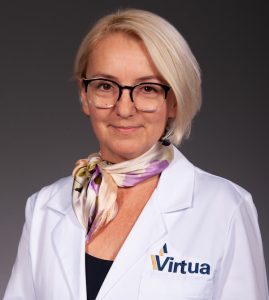
Elizabeth Revesz, MD
“Unfortunately, a lot of women who have a family history don’t know they need to be screened earlier,” says Elizabeth Revesz, MD, a breast surgeon at Virtua Breast Care. “A daughter whose mother had breast cancer should definitely be screened by 40. They have a greater likelihood of developing the disease earlier.”
Even when they do have mammograms, younger women are often at another disadvantage because their breasts are typically denser, which means they have more breast tissue than fat tissue. Tumors may not be as easy to spot on mammograms in women with dense breasts.
But when younger women are diagnosed with breast cancer, they may have young children at home and are planning to have more children, or they may not have even entered family-planning mode, so that presents a unique set of challenges. Their fertility becomes an important consideration, because ovarian function can be permanently damaged by chemotherapy.
“Fertility preservation is really important for the young woman – for the woman who has not had children, but also for the woman who has had a child and wants to have more children,” says Generosa Grana, MD, director of the MD Anderson Cancer Center at Cooper.
Grana says younger patients do have options that could help if they want to have children in the future. They could have their eggs harvested and stored before beginning treatment, or they can take medication to shut down the ovaries during chemotherapy to minimize the potentially damaging effects of the treatment.
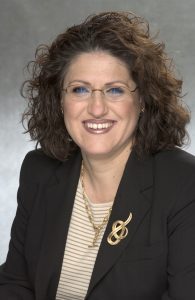
Generosa Grana, MD
“There has to be specific attention paid to how to maximize her chances of preserving fertility, using protective drugs, or both drugs and harvesting,” Grana says. “We often send these women to infertility experts as we are treating them.”
Some women who have certain types of breast cancer may be treated with hormonal therapy for 5 to 10 years, which may delay someone’s plans to have a child. “That poses a lot of issues for the women who have not had children yet or who want to have more,” Grana says.
Physicians also take a woman’s age into consideration when planning any necessary surgery.
“The trend from the breast-surgical field is the less surgery, the better. So we might opt to do breast reconstruction when we do a mastectomy,” says Kahyun Yoon-Flannery, DO, a breast surgeon at Sidney Kimmel Cancer Center in Sewell. “We really try to hide any surgical scars. If we can preserve the nipple areas, we really try. When you undergo surgery, a woman should not feel like she was butchered in some way.”
And once a woman survives breast cancer, her self-image may be permanently altered. In the younger woman, these feelings could be present for most of her life.
“Physical appearance, whether it’s loss of hair, weight gain or loss of the breast, affects women at all ages,” Grana says, “but I think it takes more of a toll on the very young woman. There may be a young woman who’s not in a relationship yet. If you’ve had a mastectomy, how do you bring that up in a conversation while dating?”
Plus, sexual dysfunction is a known side effect of breast cancer treatment. Some drugs mimic menopause and can cause vaginal dryness.
“I sometimes see couples and ask if they’re having trouble with their intimacy,” says Grana, who notes that many couples say they’re so overwhelmed by treatment, they haven’t even considered being intimate.
“Intimacy helps you get through some of your biggest challenges, so it’s worth seeking help if you need it,” she says.
For some young survivors, worrying whether the cancer may return one day may consume them, while others take it in stride.
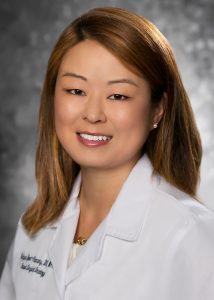
Kahyun Yoon-Flannery, DO
“Sometimes younger women struggle more than older women, and sometimes they don’t,” Yoon-Flannery says. “They don’t have time on their hands to ponder, ‘What did I just go through?’ They don’t have a moment to pause and think, ‘Okay, what’s the next step?’”
When you’re young and you’ve survived breast cancer, you are probably most concerned with getting back to your busy routine and the things that matter to you most, she adds.
“You still have your entire life ahead of you, including things like your child’s soccer games and piano lessons,” Yoon-Flannery says. “That, you can’t ignore.”
DeBolt-Buri says she doesn’t often dwell on what she went through to get healthy after the shocking diagnosis, but it does change everything.
“I thought I lived in the moment before, but I was fooling myself, putting my daughter to bed and wishing she would hurry up so I could enjoy 5 minutes of alone-time,” she says. “Now, I stay in there and talk to her for as long as I can.”


